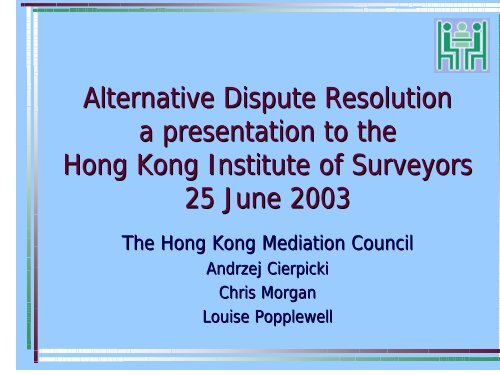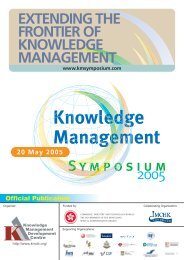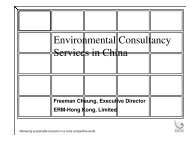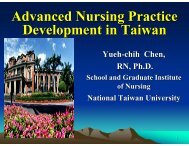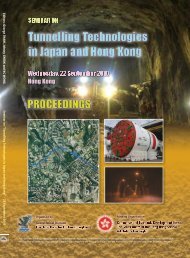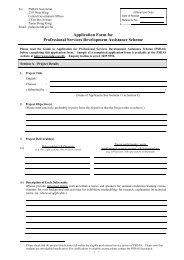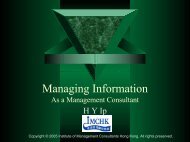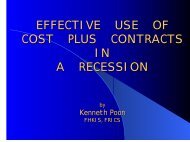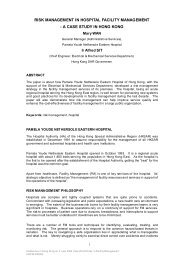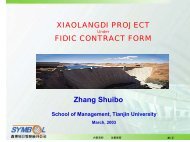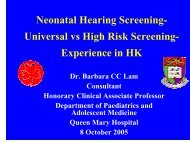Alternative Dispute Resolution a presentation to the Hong Kong ...
Alternative Dispute Resolution a presentation to the Hong Kong ...
Alternative Dispute Resolution a presentation to the Hong Kong ...
You also want an ePaper? Increase the reach of your titles
YUMPU automatically turns print PDFs into web optimized ePapers that Google loves.
<strong>Alternative</strong> <strong>Dispute</strong> <strong>Resolution</strong><br />
a <strong>presentation</strong> <strong>to</strong> <strong>the</strong><br />
<strong>Hong</strong> <strong>Kong</strong> Institute of Surveyors<br />
25 June 2003<br />
The <strong>Hong</strong> <strong>Kong</strong> Mediation Council<br />
Andrzej Cierpicki<br />
Chris Morgan<br />
Louise Popplewell
Agenda<br />
• Session One – Chris Morgan<br />
• Government Guidelines on <strong>Dispute</strong> <strong>Resolution</strong><br />
• Why Choose <strong>Alternative</strong> <strong>Dispute</strong> <strong>Resolution</strong> (ADR)?<br />
• Mediation<br />
• Video Presentation<br />
• Session Two – Andrzej Cierpicki<br />
• Emerging Trends in ADR<br />
• Adjudication<br />
• Session Three – Louise Popplewell<br />
• <strong>Dispute</strong> <strong>Resolution</strong> Advisor (DRA)<br />
• Expert Determination<br />
• Partnering<br />
• Q & A<br />
12/4/2005 <strong>Hong</strong> <strong>Kong</strong> Mediation Council 2
Session One<br />
• Introduction<br />
• Government Guidelines on<br />
<strong>Dispute</strong> <strong>Resolution</strong><br />
• Why Choose ADR?<br />
• Mediation<br />
12/4/2005 <strong>Hong</strong> <strong>Kong</strong> Mediation Council 3
Introduction<br />
• <strong>Dispute</strong>s are an inevitable part of <strong>the</strong> construction<br />
process<br />
• <strong>Dispute</strong>s need <strong>to</strong> be dealt with pro-actively and cost<br />
effectively<br />
• <strong>Dispute</strong> Management is an important aspect of<br />
effective project management<br />
• There is general dissatisfaction with arbitration as a<br />
means of resolving disputes on construction projects<br />
• This has led <strong>to</strong> <strong>the</strong> development of <strong>Alternative</strong><br />
<strong>Dispute</strong> <strong>Resolution</strong> (ADR) processes<br />
12/4/2005 <strong>Hong</strong> <strong>Kong</strong> Mediation Council 4
Government Guidelines On<br />
<strong>Dispute</strong> <strong>Resolution</strong><br />
12/4/2005 <strong>Hong</strong> <strong>Kong</strong> Mediation Council 5
Government Guidelines<br />
On <strong>Dispute</strong> <strong>Resolution</strong><br />
• Government Guidelines for Claims Management and<br />
Conduct of Negotiations in Works Contracts under<br />
<strong>the</strong> Public Works Programme<br />
– Issued by Works Bureau in December 1997 and<br />
based on <strong>the</strong> NAPCO/ACP Claims Settlement<br />
Procedure<br />
– Establishes Government policy that<br />
• protracted delays in resolving claims are not<br />
desirable<br />
• alternatives <strong>to</strong> arbitration should be considered<br />
12/4/2005 <strong>Hong</strong> <strong>Kong</strong> Mediation Council 6
Government Guidelines<br />
On <strong>Dispute</strong> <strong>Resolution</strong><br />
• Administrative Guidelines for Construction<br />
Mediations (WBTC 4/99)<br />
– Issued with Government’s revised Construction<br />
Mediation Rules in February 1999<br />
– Establishes Government policy <strong>to</strong> implement<br />
mediation in appropriate cases<br />
• <strong>Dispute</strong> <strong>Resolution</strong> Adviser Scheme<br />
12/4/2005 <strong>Hong</strong> <strong>Kong</strong> Mediation Council 7
Report of <strong>the</strong> Construction Industry Review<br />
Committee Construct for Excellence<br />
<strong>Resolution</strong> of claims and disputes<br />
Consistent with our overall objective of facilitating project delivery,<br />
We recommend that –<br />
• Employers, consultants and contrac<strong>to</strong>rs should be encouraged <strong>to</strong><br />
adopt a proactive approach, with sufficient high level support and<br />
involvement, <strong>to</strong> resolving claims and disputes as <strong>the</strong>y arise. Training<br />
for <strong>the</strong> project team and o<strong>the</strong>r resources should be made available <strong>to</strong><br />
ensure <strong>the</strong> effective implementation of this approach; and<br />
• Proactive and collaborative ways of dispute resolution should be<br />
encouraged through <strong>the</strong> adoption in contracts of provisions which<br />
facilitate <strong>the</strong> resolution of disputes by means of alternative dispute<br />
resolution techniques (such as <strong>the</strong> use of a dispute resolution adviser<br />
and/or dispute review board, in addition <strong>to</strong> formal and binding<br />
adjudication means which will remain a necessary, but last resort,<br />
solution.<br />
12/4/2005 <strong>Hong</strong> <strong>Kong</strong> Mediation Council 8
Why Choose<br />
<strong>Alternative</strong> <strong>Dispute</strong> <strong>Resolution</strong><br />
(ADR)?<br />
12/4/2005 <strong>Hong</strong> <strong>Kong</strong> Mediation Council 9
Why Choose ADR?<br />
• Control<br />
– Arbitration is controlled by formalised, time<br />
consuming and costly procedures<br />
– In ADR, <strong>the</strong> parties are in a better position <strong>to</strong><br />
control <strong>the</strong> scope and progress of <strong>the</strong> dispute<br />
• Speed<br />
– Arbitration is a lengthy, time consuming process<br />
– ADR processes are much quicker<br />
12/4/2005 <strong>Hong</strong> <strong>Kong</strong> Mediation Council 10
Why Choose ADR?<br />
• Creativity and Flexibility<br />
– In arbitration, <strong>the</strong> dispute is restricted <strong>to</strong> <strong>the</strong><br />
matters contained in <strong>the</strong> pleadings<br />
– ADR provides opportunities for <strong>the</strong> parties <strong>to</strong> be<br />
more flexible and creative<br />
• Cost<br />
– Arbitration invariably involves substantial costs<br />
– Substantial costs savings can be made by using<br />
<strong>the</strong> ADR processes<br />
12/4/2005 <strong>Hong</strong> <strong>Kong</strong> Mediation Council 11
Mediation<br />
12/4/2005 <strong>Hong</strong> <strong>Kong</strong> Mediation Council 12
Mediation<br />
• Why Use Mediation<br />
• Definition<br />
• Neutral ~ Media<strong>to</strong>r<br />
• Rules / Guidelines / Mediation Agreement<br />
• You’re in Good Company!<br />
12/4/2005 <strong>Hong</strong> <strong>Kong</strong> Mediation Council 13
Why use Mediation?<br />
• Flexible - can use <strong>to</strong> settle<br />
–Before Completion<br />
– During Arbitration or Litigation<br />
• Flexible - solution not restricted by contract<br />
• Quicker & cheaper than Arbitration & Litigation<br />
– Weeks vs Years<br />
– $ ~ approx 2 – 20% of Arbitration / Litigation<br />
• Can’t lose - if don’t like result, walk away<br />
• Win / win situation<br />
• Maintain business relationship<br />
12/4/2005 <strong>Hong</strong> <strong>Kong</strong> Mediation Council 14
Definition<br />
• Neutral person (Media<strong>to</strong>r) helps Parties<br />
• Negotiate settlement<br />
• Unconstrained by <strong>the</strong>ir contract<br />
• Private, voluntary & (until signed) nonbinding<br />
• Confidential<br />
12/4/2005 <strong>Hong</strong> <strong>Kong</strong> Mediation Council 15
Neutral ~ Media<strong>to</strong>r<br />
• Adds structure / process<br />
• Assists communication<br />
• Focuses on needs and interests of <strong>the</strong> parties<br />
• Identifies obstacles <strong>to</strong> settlement<br />
• Closes information gaps<br />
• Narrows differences<br />
• Agent of reality<br />
• Encourages alternative views and options<br />
12/4/2005 <strong>Hong</strong> <strong>Kong</strong> Mediation Council 16
Neutral ~ Media<strong>to</strong>r (cont’d)<br />
• Controls Emotions<br />
• Can meet Parties privately<br />
• Doesn’t decide outcome<br />
12/4/2005 <strong>Hong</strong> <strong>Kong</strong> Mediation Council 17
Rules / Guidelines / Mediation<br />
Agreement<br />
• Works Branch Technical Circular 4/99:<br />
– Construction mediation rules (1999 Edition)<br />
– Administrative Guidelines<br />
•Rules<br />
– Short, simple - 15 clauses<br />
Rule 1. Definition of Mediation<br />
Rule 2. Application of Rules<br />
Rule 3. Initiation of <strong>the</strong> mediation process<br />
12/4/2005 <strong>Hong</strong> <strong>Kong</strong> Mediation Council 18
Rules / Guidelines / Mediation<br />
Agreement (cont’d)<br />
• Rules (cont’d)<br />
Rule 4. Response <strong>to</strong> request for mediation<br />
Rule 5. Appointment of <strong>the</strong> media<strong>to</strong>r<br />
Rule 6. Disqualification of <strong>the</strong> media<strong>to</strong>r<br />
Rule 7. The mediation process<br />
Rule 8. Role of <strong>the</strong> media<strong>to</strong>r<br />
Rule 9. Role of <strong>the</strong> parties<br />
Rule 10. Re<strong>presentation</strong><br />
Rule 11. Termination of mediation<br />
12/4/2005 <strong>Hong</strong> <strong>Kong</strong> Mediation Council 19
Rules / Guidelines / Mediation<br />
Agreement (cont’d)<br />
• Rules (cont’d)<br />
Rule 12. Confidentiality<br />
Rule 13. Costs<br />
Rule 14. Media<strong>to</strong>r’s role in subsequent proceedings<br />
Rule 15. Exclusion of liability<br />
12/4/2005 <strong>Hong</strong> <strong>Kong</strong> Mediation Council 20
Rules / Guidelines / Mediation<br />
Agreement (cont’d)<br />
• Administrative Guidelines<br />
2. Policy - “The policy is <strong>to</strong> implement mediation<br />
wherever it is possible that a dispute may be resolved<br />
speedily and at least cost <strong>to</strong> government should <strong>the</strong><br />
dispute escalate <strong>to</strong> formal arbitration or litigation. In<br />
an ongoing contract this should also avoid<br />
unnecessary escalation of <strong>the</strong> dispute or festering of<br />
<strong>the</strong> relationship. In a contract where a dispute has<br />
already been referred <strong>to</strong> arbitration or litigation,<br />
mediation may still provide a cheaper, speedier and<br />
more acceptable solution”.<br />
12/4/2005 <strong>Hong</strong> <strong>Kong</strong> Mediation Council 21
Rules / Guidelines / Mediation<br />
Agreement (cont’d)<br />
• Administrative Guidelines<br />
Paragraphs 11-15 - set out mediation process<br />
• Preliminary Meeting<br />
•Mediation :<br />
– Opening Statement by media<strong>to</strong>r;<br />
– Each party presents its case;<br />
– Discussions with media<strong>to</strong>rs ei<strong>the</strong>r jointly or<br />
separately.<br />
• Facilitates settlement agreement<br />
12/4/2005 <strong>Hong</strong> <strong>Kong</strong> Mediation Council 22
You’re in Good Company!<br />
Government<br />
• All General Conditions<br />
(GC)<br />
• Airport Core Programme<br />
GC<br />
• Design & Build<br />
• Consultants’ Conditions<br />
of Employment<br />
• Not yet in Sub-<br />
Contracts (coming)<br />
Private / Quasi-Govt<br />
• Kowloon Can<strong>to</strong>n<br />
Railway Corporation GC<br />
• MTR Corporation GC<br />
• Airport Authority GC<br />
• <strong>Hong</strong> <strong>Kong</strong> Construction<br />
Association Domestic<br />
Sub-Contract<br />
• Not yet in <strong>Hong</strong> <strong>Kong</strong><br />
Institute of Architects<br />
Building contract<br />
(coming)<br />
12/4/2005 <strong>Hong</strong> <strong>Kong</strong> Mediation Council 23
Video Presentation<br />
• A Mock Mediation<br />
12/4/2005 <strong>Hong</strong> <strong>Kong</strong> Mediation Council 24
Session Two<br />
• Emerging Trends in ADR<br />
• Adjudication<br />
12/4/2005 <strong>Hong</strong> <strong>Kong</strong> Mediation Council 25
Emerging Trends in ADR<br />
12/4/2005 <strong>Hong</strong> <strong>Kong</strong> Mediation Council 26
Emerging Trends in ADR<br />
• Early <strong>Resolution</strong><br />
• Concurrent with project works<br />
• Solve <strong>the</strong> dispute and move on<br />
• Preserve <strong>the</strong> commercial relationship<br />
12/4/2005 <strong>Hong</strong> <strong>Kong</strong> Mediation Council 27
Ana<strong>to</strong>my of Construction <strong>Dispute</strong>s - Anticipation<br />
12/4/2005 <strong>Hong</strong> <strong>Kong</strong> Mediation Council 28
Ana<strong>to</strong>my of Construction <strong>Dispute</strong>s - Actuality<br />
12/4/2005 <strong>Hong</strong> <strong>Kong</strong> Mediation Council 29
Ana<strong>to</strong>my of Construction <strong>Dispute</strong>s - Adversity<br />
12/4/2005 <strong>Hong</strong> <strong>Kong</strong> Mediation Council 30
Ana<strong>to</strong>my of Construction <strong>Dispute</strong>s – Agony<br />
12/4/2005 <strong>Hong</strong> <strong>Kong</strong> Mediation Council 31
Emerging Trends in ADR<br />
• Quicker Settlement<br />
• Shorter timescales – weeks v years<br />
• Less reliance on formal hearings<br />
• Less Documentation – no discovery<br />
• Save time and money<br />
12/4/2005 <strong>Hong</strong> <strong>Kong</strong> Mediation Council 32
Emerging Trends in ADR<br />
• Cost savings<br />
• Streamlined processes<br />
• Reduced pre hearing procedures<br />
• Limited hearings or documents only<br />
• Reduced re<strong>presentation</strong><br />
• Costs proportionate <strong>to</strong> dispute<br />
12/4/2005 <strong>Hong</strong> <strong>Kong</strong> Mediation Council 33
Emerging Trends in ADR - Costs<br />
Small Arbitration/Litigation Costs<br />
• Below $25million in dispute<br />
• Preparation costs per party from $5 million <strong>to</strong> $12<br />
million<br />
• Hearing costs of $1/2 million per week<br />
• Total costs in excess of around $15 million<br />
• Worst case scenario of around $25 million<br />
• Timescale 18 –24 months following project<br />
completion<br />
12/4/2005 <strong>Hong</strong> <strong>Kong</strong> Mediation Council 34
Emerging Trends in ADR - Costs<br />
Major Arbitration/Litigation Costs<br />
• $100+ million in dispute<br />
• Preparation costs from $30 million <strong>to</strong> $80 million<br />
• Hearing costs in excess of $1 million per week<br />
• Total costs in excess of $100 million<br />
• Worst case scenario of around $170 million<br />
• Timescale 18 –36 months following project<br />
completion<br />
12/4/2005 <strong>Hong</strong> <strong>Kong</strong> Mediation Council 35
Adjudication - Costs<br />
• UK CIC Report<br />
• c.5000 adjudications<br />
• Average value $ 2.5m<br />
• Average time 35 hours<br />
• Average cost/hr $1.3k<br />
• Adjudica<strong>to</strong>r cost >$50k<br />
• Party costs say $75k<br />
• Total >200k/dispute<br />
• <strong>Dispute</strong> settlement - 5<br />
weeks<br />
12/4/2005 <strong>Hong</strong> <strong>Kong</strong> Mediation Council 36
Mediation - Costs<br />
Simple <strong>Dispute</strong><br />
• Parties only<br />
• No re<strong>presentation</strong><br />
• $4 -5,000 per party<br />
per minimum half<br />
day<br />
• Plus management<br />
time<br />
Complex <strong>Dispute</strong><br />
• Parties plus legal and<br />
expert re<strong>presentation</strong><br />
• 2 week process<br />
• Cost per party<br />
Preparation min $500,000<br />
Hearing $750,000<br />
• Plus management time<br />
12/4/2005 <strong>Hong</strong> <strong>Kong</strong> Mediation Council 37
Expert Determination - Costs<br />
• Costs similar <strong>to</strong> documents-only adjudication<br />
• Expert $15-20k per day<br />
• Plus document preparation time<br />
• Approximate cost $50 – 250k for simple<br />
(>one week) disputes including preparation<br />
12/4/2005 <strong>Hong</strong> <strong>Kong</strong> Mediation Council 38
Emerging Trends in ADR<br />
• New Contract Solutions<br />
• Change of Risk Allocation<br />
• Increased options for settlement<br />
• Compulsory ADR prior <strong>to</strong> Arbitration<br />
• SCL Pro<strong>to</strong>col on EOT and Delay/Disruption<br />
entitlements<br />
• Industry specialisation and fragmentation<br />
12/4/2005 <strong>Hong</strong> <strong>Kong</strong> Mediation Council 39
Emerging Trends in ADR<br />
• New Technology<br />
• Better and Faster Information Flow and<br />
Communications - Web Based Project<br />
Management<br />
• Document Management<br />
• Better Programme/Progress management –<br />
Software advances<br />
• Open Book Contracting<br />
12/4/2005 <strong>Hong</strong> <strong>Kong</strong> Mediation Council 40
Emerging Trends in ADR<br />
• Emphasis on Long Term Considerations<br />
• Evergreen Relationships<br />
• Selective Tendering<br />
• Partnering<br />
12/4/2005 <strong>Hong</strong> <strong>Kong</strong> Mediation Council 41
Summary of ADR trends<br />
• Early <strong>Resolution</strong><br />
• Quicker Settlement<br />
• Cheaper and Proportionate<br />
• New Contract Solutions<br />
• New Technology<br />
• Long Term Relationships<br />
12/4/2005 <strong>Hong</strong> <strong>Kong</strong> Mediation Council 42
Adjudication
Adjudication<br />
• A semi formal procedure utilizing a third party<br />
neutral who makes a ruling on <strong>the</strong> parties<br />
rights and obligations based upon evidence<br />
submitted<br />
• Can be final and binding or interim pending<br />
formal proceedings<br />
• Incorporated in<strong>to</strong> ACP contracts and NEC but<br />
rarely used in <strong>Hong</strong> <strong>Kong</strong> <strong>to</strong> date<br />
• Likely <strong>to</strong> be introduced in<strong>to</strong> selected<br />
Government contracts in <strong>the</strong> near future<br />
12/4/2005 <strong>Hong</strong> <strong>Kong</strong> Mediation Council 44
Adjudication in UK<br />
• Latham report and subsequent legislation<br />
required compulsory adjudication provisions<br />
in all construction contracts<br />
• Speed up payment flows, reduce <strong>the</strong><br />
incidence of formal disputes<br />
• Resounding success<br />
• Nearly 5000 adjudications in <strong>the</strong> first 40<br />
months<br />
12/4/2005 <strong>Hong</strong> <strong>Kong</strong> Mediation Council 45
Adjudication – UKCIC Report 1<br />
12/4/2005 <strong>Hong</strong> <strong>Kong</strong> Mediation Council 46
Adjudication – UKCIC Report 2<br />
12/4/2005 <strong>Hong</strong> <strong>Kong</strong> Mediation Council 47
Adjudication – UKCIC Report 3<br />
12/4/2005 <strong>Hong</strong> <strong>Kong</strong> Mediation Council 48
Adjudication – UKCIC Report 4<br />
12/4/2005 <strong>Hong</strong> <strong>Kong</strong> Mediation Council 49
Adjudication – UKCIC Report 5<br />
12/4/2005 <strong>Hong</strong> <strong>Kong</strong> Mediation Council 50
Adjudication – UKCIC Report 6<br />
12/4/2005 <strong>Hong</strong> <strong>Kong</strong> Mediation Council 51
Adjudication – A Summary<br />
• A quick and cheap alternative <strong>to</strong> formal<br />
proceedings<br />
• Useful as industry moves away from<br />
traditional employer/contrac<strong>to</strong>r relationship<br />
and becomes more fragmented<br />
• Seen as a success in UK where its inclusion in<br />
construction contracts is manda<strong>to</strong>ry<br />
• Perhaps due for a return in <strong>Hong</strong> <strong>Kong</strong>?<br />
12/4/2005 <strong>Hong</strong> <strong>Kong</strong> Mediation Council 52
Session Three<br />
• <strong>Dispute</strong> <strong>Resolution</strong> Advisor<br />
• Expert Determination<br />
• Partnering<br />
12/4/2005 <strong>Hong</strong> <strong>Kong</strong> Mediation Council 53
<strong>Dispute</strong> <strong>Resolution</strong> Advisor<br />
(DRA)
<strong>Dispute</strong> <strong>Resolution</strong> Advisor<br />
- Implemented by ASD – 1992.<br />
- Basic Concept – early resolution of<br />
disputes using a third party.<br />
- The system is only as good as <strong>the</strong><br />
DRA who is appointed.<br />
12/4/2005 <strong>Hong</strong> <strong>Kong</strong> Mediation Council 55
ASD Conditions of Contract<br />
- Architect’s decision final and binding<br />
unless a notice of dispute served<br />
within 28 days.<br />
- If a party is not satisfied with a<br />
decision <strong>the</strong> site representatives must<br />
try and resolve <strong>the</strong>ir differences by<br />
negotiation.<br />
12/4/2005 <strong>Hong</strong> <strong>Kong</strong> Mediation Council 56
ASD Conditions of Contract<br />
- If still no resolution <strong>the</strong> dissatisfied<br />
party must serve a notice of dispute.<br />
- DRA and site representatives <strong>the</strong>n have<br />
14 days <strong>to</strong> resolve <strong>the</strong> disputes.<br />
- If still no resolution DRA must produce a<br />
report on <strong>the</strong> dispute.<br />
12/4/2005 <strong>Hong</strong> <strong>Kong</strong> Mediation Council 57
ASD Conditions of Contract<br />
- DRA’s report is sent <strong>to</strong> <strong>the</strong> parties senior<br />
managers.<br />
- The parties senior managers must meet<br />
<strong>to</strong> try and reach a settlement.<br />
- If a resolution is not reached within 14<br />
days of <strong>the</strong> DRA’s report <strong>the</strong> dispute is<br />
referred <strong>to</strong> arbitration.<br />
12/4/2005 <strong>Hong</strong> <strong>Kong</strong> Mediation Council 58
Expert Determination<br />
12/4/2005 <strong>Hong</strong> <strong>Kong</strong> Mediation Council 59
Expert Determination<br />
• The expert and his role: -<br />
• Someone possessed of special skills<br />
who is asked <strong>to</strong> make findings and<br />
<strong>to</strong> give a decision in respect of a<br />
dispute after both parties have been<br />
given an opportunity <strong>to</strong> make<br />
re<strong>presentation</strong>s.<br />
12/4/2005 <strong>Hong</strong> <strong>Kong</strong> Mediation Council 60
Expert Determination<br />
Expert determination is a contract<br />
based ADR technique.<br />
The contract must provide <strong>the</strong> framework.<br />
Subject <strong>to</strong> specific provision being agreed<br />
within <strong>the</strong> contract <strong>the</strong> parties have<br />
nothing <strong>to</strong> fall back on if matters start <strong>to</strong><br />
go wrong (e.g. Ss 25 and 26 of <strong>the</strong><br />
Arbitration Ordinance).<br />
12/4/2005 <strong>Hong</strong> <strong>Kong</strong> Mediation Council 61
Expert Determination<br />
-Binding or not binding?<br />
-Problems of<br />
enforceability<br />
12/4/2005 <strong>Hong</strong> <strong>Kong</strong> Mediation Council 62
Recent Case Law<br />
- Fletcher Construction Australia Ltd v<br />
MPH Group Pty Ltd (Unreported<br />
1997).<br />
- Baulders<strong>to</strong>ne v Kayah Holdings Pty<br />
Ltd (1998) 14 & CL 277.<br />
12/4/2005 <strong>Hong</strong> <strong>Kong</strong> Mediation Council 63
Partnering<br />
• “A set of strategic actions which<br />
embody <strong>the</strong> mutual objectives of a<br />
number of firms achieved by cooperative<br />
decision making aimed at<br />
using feedback <strong>to</strong> continuously<br />
improve <strong>the</strong>ir joint performance”<br />
[The Seven Pillars of Partnering – 1998]<br />
12/4/2005 <strong>Hong</strong> <strong>Kong</strong> Mediation Council 64
• For fur<strong>the</strong>r information on Mediation or o<strong>the</strong>r<br />
methods of <strong>Dispute</strong> <strong>Resolution</strong> contact:<br />
The <strong>Hong</strong> <strong>Hong</strong> Mediation Council<br />
<strong>Hong</strong> <strong>Kong</strong> International Arbitration Centre<br />
38 Floor, Two Exchange Square<br />
Central, <strong>Hong</strong> <strong>Kong</strong><br />
adr@hkiac.org<br />
12/4/2005 <strong>Hong</strong> <strong>Kong</strong> Mediation Council 66


